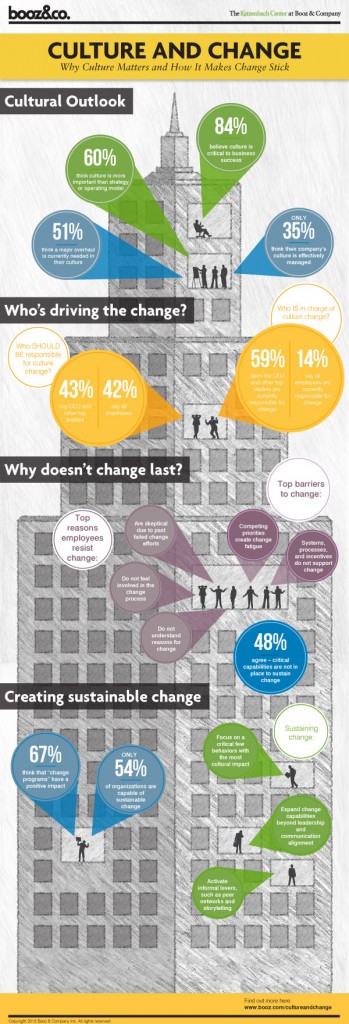
click for full PDF of the infographic
This infographic from Booz & Co (one of the oldest management consultancies around) is based on a 2013 survey of over 2000 managers and has some blinding stats in it on attitudes to culture change.
- 84% of managers think corporate culture is “critical to business success”
- 60% think culture is “more important than strategy or operating model”
- 51% think a “major overhaul is needed”
- Only 35% think their culture is “effectively managed”.
That means at least 8 out of 10 managers are toeing the party line that people count and working culture matters BUT only 3 out of 10 are confident enough to say they are delivering on that promise.
The 65% left over means two thirds of managers are unable to say their culture is effectively managed.
Something is both sad and fishy here. If practically the whole management team is violently agreeing that culture and people matter, how come 2/3rds of them aren’t delivering on what should be one of their primary functions?
Think about that for a minute. There’s either a hell of lot of hot air and lip service being paid to culture or about 2/3rds of managers are struggling to engage with a problem that, if solved, could deliver massive competitive advantage to them.
Sounds like a classic case of Everybody, Somebody, Anybody, Nobody:
- Everybody knows there’s a problem.
- Somebody should do something about it.
- Anybody could start taking steps but Nobody does anything.
In the absence of a little brave thinking it’s easy to turn to the old faithfuls of new targets, new visions, new strategy to fix problems but most of the time all you’ll end up doing is teaching your team to work to different set of numbers – it’s just shuffling the same pieces around into slightly different configurations. That’s not culture change, that’s gaming the system.
If you’re serious about changing company culture, it doesn’t have to be grand and require massive upheaval or even cost anything. It just requires trust in your people and a little courage to discover and nuture your pockets of excellence. Improve the systems, nurture your culture and performance will happen.

